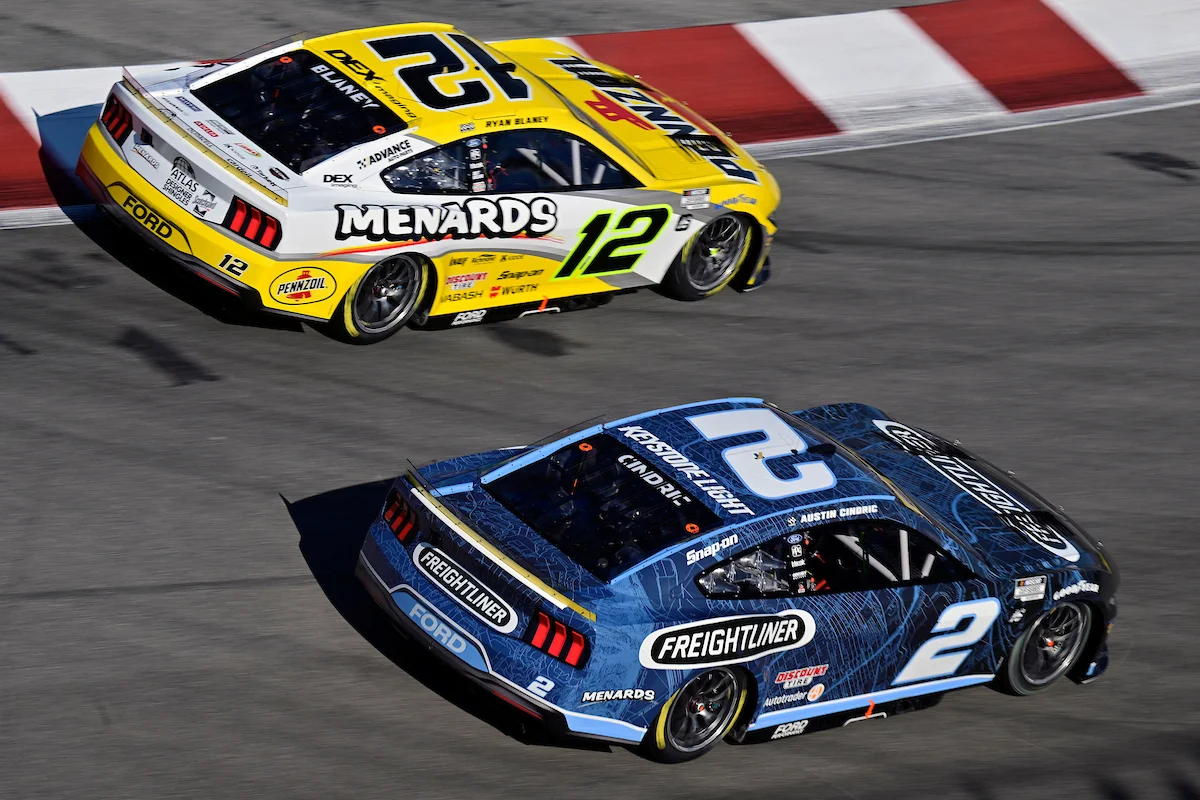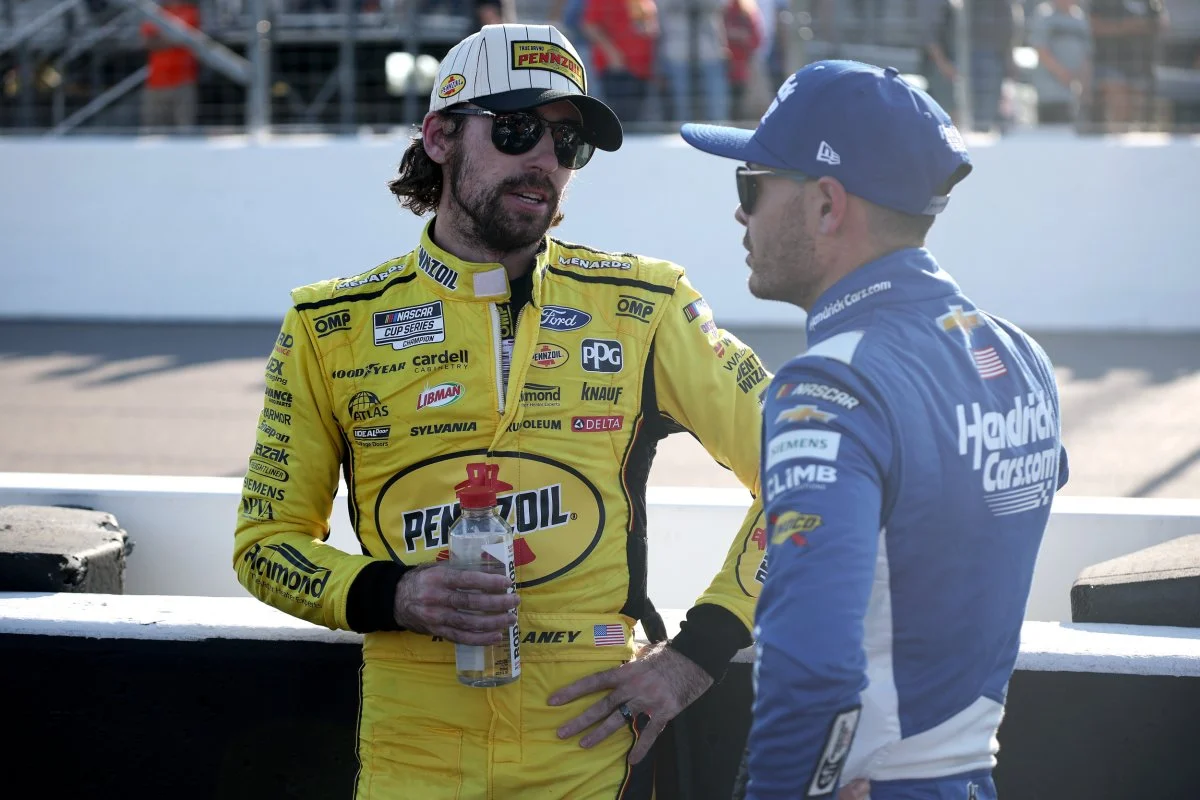During a recent turn of events in the NASCAR Cup Series, Ryan Blaney’s long-held “nice guy” reputation came under question after a tense on-track altercation and an honest admission about his occasional rude moments. The unexpected reaction from Blaney, a driver famed for his cool demeanor, has prompted discussions about whether his gentle approach is an asset or liability in the fiercely competitive NASCAR environment, spotlighting the Ryan Blaney NASCAR nice guy image.
Pressure Ramps Up for Ryan Blaney in Intense NASCAR Showdown
At Phoenix Raceway in Avondale, Arizona, the championship tension was palpable as Ryan Blaney prepared for the NASCAR Cup Series title race. With the high stakes, mistakes and heated rivalries were expected. On lap 135 of the Enjoy Illinois 300, Kyle Larson got into a heated contest with Blaney for fifth position. Larson, after several laps of aggressive pursuit, grew impatient and misjudged his move, resulting in an incident that drew attention across the racing world. Speaking about the altercation, Larson acknowledged his error:
“He should be upset. I just misjudged it.”
—Kyle Larson, NASCAR Cup Series Driver. Rather than respond in fury like many anticipated, Blaney kept his cool on and off the track, leading to confusion among NASCAR veterans who are used to more combative displays in high-pressure moments.

The incident, which unfolded in front of fans and under the scrutiny of cameras, further cemented the relentless nature of the playoffs. With championship hopes on the line, Cup Series drivers such as Blaney and Larson know every race can define careers, and the pressure to balance aggression and composure is immense.
Veteran Drivers Question Blaney’s Reaction and Approach
Kyle Petty, a celebrated figure with nine Cup Series wins, vocalized his surprise at Blaney’s mellow response following Gateway’s high-stakes tangle. Petty hails from an era where settling scores on the racetrack took precedence over calm explanations in interviews. He referred to Blaney’s post-event radio message toward Larson:
“I don’t know what he was thinking there.”
—Ryan Blaney, NASCAR Cup Series Driver.
For Petty, this wasn’t enough. He publicly urged Blaney to show more fire, reflecting:
“You can be nice in the motorhome lot. You can be nice in the media center. But when you’re out there fighting for a championship, nice doesn’t get you to Victory Lane.”
—Kyle Petty, Former NASCAR Driver and Analyst.
Blaney, often admired for his self-control and courtesy, drew additional scrutiny from fans and veterans, who speculated whether an intensified attitude could yield greater success in the fiercely competitive world of motorsports. The Gateway incident became a flashpoint for larger conversations about how drivers manage rivalry, strategy, and emotional intensity under championship pressure.
Ryan Blaney Admits to a Rarely Seen ‘Rude’ Streak Off the Track
Blaney’s public image took another turn during a guest appearance on the ‘Casuals’ podcast, hosted by Katie Nolan. Nolan echoed Petty’s critique, asking Blaney if he is perhaps “too nice” for NASCAR’s bruising demands. Blaney responded wryly,
“It’s better than saying, is he too much of an a——.”
—Ryan Blaney, NASCAR Cup Series Driver.
Despite playing up his reputation for composure, Blaney admitted that a harsher side exists, emerging in certain situations. He confessed,
“I can be, but it’s in certain regards. I don’t try to be…Someone was an a—— to me at the airport this morning.”
—Ryan Blaney, NASCAR Cup Series Driver.
Describing this rare moment of rudeness, Blaney recounted an airport boarding scenario where confusion and impatience in the queue led to a confrontation. He recalled,
“They were boarding, and this guy’s standing. You know how people crowd the entry. Yeah, he wasn’t in line, but he was kind of in line. So I just kind of went around him. And it’s my turn to board, and I’m going. But apparently, he was in line, and the guy was like, Look at that guy. Just so privileged.”
—Ryan Blaney, NASCAR Cup Series Driver.
The exchange escalated, marking a rare moment when Blaney responded directly:
“I had headphones on, but they weren’t on, so I actually heard him…And I turned around at him and said, Buddy, if you’re in line, stand like you’re in line. And I let him go in front of me. That’s probably as rude as I would get with somebody.”
—Ryan Blaney, NASCAR Cup Series Driver.
While this airport story did not stem from NASCAR tensions, it showed a layer of personality that fans rarely witness. Blaney’s willingness to assert himself when provoked off the racetrack contrasts sharply with the restraint he usually displays during heated moments in competition. For some observers, it raised the question of whether his “nice guy” demeanor is a deliberate strategy or just a natural part of his identity that only falters under specific conditions.
Questions Arise About Blaney’s Nice Guy Image in NASCAR
As the story circulated through the fanbase, many debated whether Ryan Blaney’s measured, polite reputation is a strategic strength or an unhelpful weakness when every point matters. The response to the Gateway incident underscored NASCAR’s evolving standards for confrontation and sportsmanship. Blaney’s handling of the situation was compared to a bygone era, marked by abrasive on-track justice rather than calm post-race discussion.
Kyle Petty, along with other veterans, continued to call on Blaney to balance politeness with the determination necessary to win at the sport’s highest level. The specifics of the race, and the aftermath, led some fans and insiders to reflect on how personality and emotional resilience interact in building a NASCAR champion. With championship contenders such as Blaney and Larson still vying for the title, these dynamics are scrutinized in every stage of the playoffs.
Dale Jr., Kyle Larson, and the Aftermath of Gateway Collision
Kyle Larson, known for his calculated aggressiveness, seldom spins out fellow front-runners. His tangle with Ryan Blaney caught the eye of many in NASCAR circles, especially since both drivers are pressing hard for championship glory this season. Dale Jr., a respected former driver and broadcaster, openly puzzled over the nature of the incident:
“Larson racing aggressive. What was that all about? He spins Blaney out. I’ve watched this replay, and I can’t figure it out. Came from five car links back.”
—Dale Earnhardt Jr., NASCAR Analyst and Former Driver.
Despite suffering setbacks and dropping to 17th place, Blaney showed strategic acumen by mounting a charge back into the top five, ultimately finishing fourth. Larson, hampered by ill-timed caution periods, dropped to 12th despite leading for over 50 laps. The playoff points standings still favor both drivers, with Larson holding a 60-point lead above the cut and Blaney 42 points clear. Yet the emotional residue from their clash lingers.
Reflecting on the encounter, Dale Jr. further commented:
“It’s kind of the best drivers in the world, having to be perfectly precise and be overly aggressive, and trying to learn how to make this car pass at a track where it was difficult to pass.”
—Dale Earnhardt Jr., NASCAR Analyst and Former Driver.
Blaney made it clear that the incident is not easily forgotten:
“Even though it wasn’t done with malicious intent, I’ll still remember it. I still got the [expletive] end of it and got turned around and had to come from the back…It’s just those racing situations that you think about the next time you run with that person. You probably run them a little tighter and don’t give them as much space.”
—Ryan Blaney, NASCAR Cup Series Driver.
The Road Ahead: Will Blaney’s Dual Nature Shape the Playoff Battle?
The events at Phoenix Raceway and their aftermath highlight the complex interplay of personality, competition, and strategy in today’s NASCAR Cup Series. For a driver like Ryan Blaney, the Ryan Blaney NASCAR nice guy image has brought admiration from fans and professionals, yet now faces scrutiny as rivals question whether it holds him back amid career-defining moments. His ability to rebound from the Gateway incident and his frank admission of rare off-track assertiveness add new dimensions to his public persona, influencing how other competitors like Kyle Larson or Kyle Petty might approach him going forward.
As the season pushes toward its dramatic conclusion, all eyes are on Blaney to see if the cracks in his gentle image will influence his racecraft or if he will maintain his trademark composure in pursuit of another championship run. The outcome will not only affect the title chase but also contribute to the ongoing debate about what it truly takes to win—and keep winning—in NASCAR’s high-octane, ever-evolving world.
